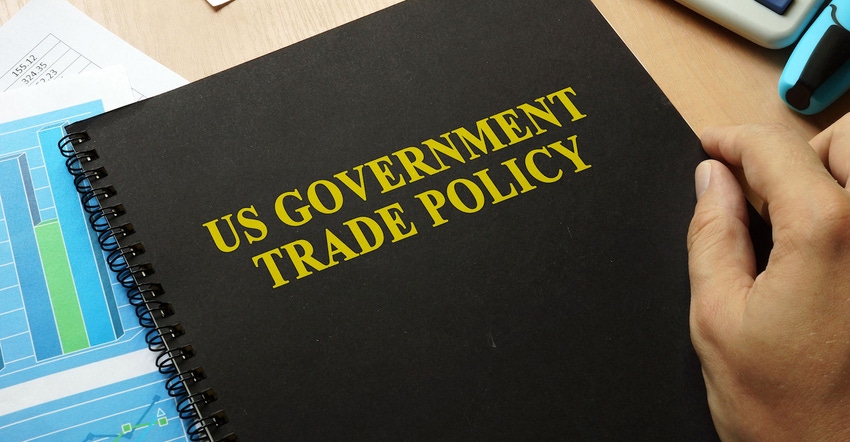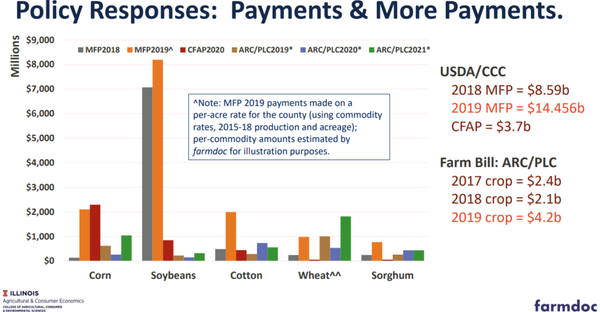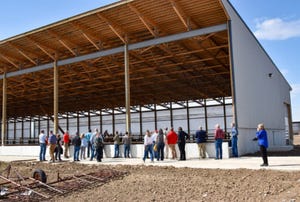Trump’s ag trade policy leaves some concerned
Farm government payments see huge influx from Trump's trade wars.

“The only thing that has kept farmers afloat since the Trump Administration started a war on trade back in 2018 has been influxes from the U.S. Treasury” Department, with trade mitigation payments of $12 billion in 2018, $16 billion in 2019, another $19 billion at the start of 2020 and now possibly another $20-30 billion for coronavirus relief assistance, Ohio farmer Chris Gibbs said.
President Donald Trump has consistently said he’ll stand up for farmers and won’t let other countries wrongly target U.S. agriculture, but is the retaliatory response -- and the actions that set off the tariffs in the first place -- causing more harm than good?
During a North American Ag Roundtable hosted by Uncommon Ground, Daren Baskt, senior research fellow in agricultural trade at the Heritage Foundation, expressed concerns that the increased use of Commodity Credit Corp. (CCC) funds at the discretion of the secretary of agriculture could be completely changing the dynamic of U.S. policy and trade relationships. The CCC spending limit has been capped at $30 billion in recent years, but with the influx of money for trade mitigation payments and this year’s Coronavirus Food Assistance Program (CFAP) payments, some in Congress are pushing to codify in law giving the agriculture secretary unrestricted permission to dole out as much as $68 billion per year.
Baskt questioned whether this type of trade support would eventually become interwoven in farmers’ reliance on the aid as well as disrupt market-driven dynamics for agricultural producers.
Joe Glauber, senior research fellow at the International Food Policy Research Institute and former U.S. Department of Agriculture chief economist, said many U.S. farm programs are countercyclical in nature, where lower yields or prices are offset with higher payments. All of the new trade assistance on top of the existing price supports should give the industry reason to pause. He said it likely will push U.S. agricultural support over the allowable limits at the World Trade Organization.
He warned that higher payouts to farmers will bring a lot of attention worldwide to U.S. farmers -- attention the U.S. doesn’t want in WTO. Even though the WTO dispute settlement process is broken, U.S. farmers have won 80% of agricultural cases brought to WTO. Glauber warned that the payouts could tarnish the U.S. reputation abroad.
“We need to think very hard about using these authorities to broaden these authorities because I think that would be a real mistake,” Glauber warned.
Gibbs, who raises 560 acres of corn, soybeans and alfalfa and has an 85-cow/calf operation in Ohio, said despite being a loyal Republican for the last 20 years, he will be voting differently this fall.
“In my state, I see farmers deeply in debt and increasingly reliant on federal government subsidies,” Gibbs said. “While he talks a good game, Donald Trump’s vision for agriculture doesn’t seem to offer any change to these trends.”
Gibbs, who serves as a board member of Rural America 2020, part of a grassroots coalition of farmers speaking out on current policies in rural America, said Trump has disputed trading relationships on every front -- from China to the European Union to our closest North American partners, Canada and Mexico. “His war on trade has not resulted in significant improvements for American agriculture that we couldn’t have achieved with allies,” he said.
While the North America Free Trade Agreement (NAFTA) has been rebranded the new U.S.-Mexico-Canada Agreement (USMCA), Gibbs said it really is more like a new roof and paint job on a comfortable old home. All the changes “could have been made with diplomatic skill rather than threats,” he added.
“The President continues to tell me that I’m a patriot for taking one for the team. That’s an insult,” Gibbs said. “Making sure my farm is viable and I continue to produce for my family, my local community, my hardware store, my fix-it-shop and my locals schools through property taxes: that’s what makes me a patriot, not going out of business.”

https://farmdocdaily.illinois.edu/webinar/updated-perspectives-on-the-pandemic-and-policy-responses
About the Author(s)
You May Also Like





